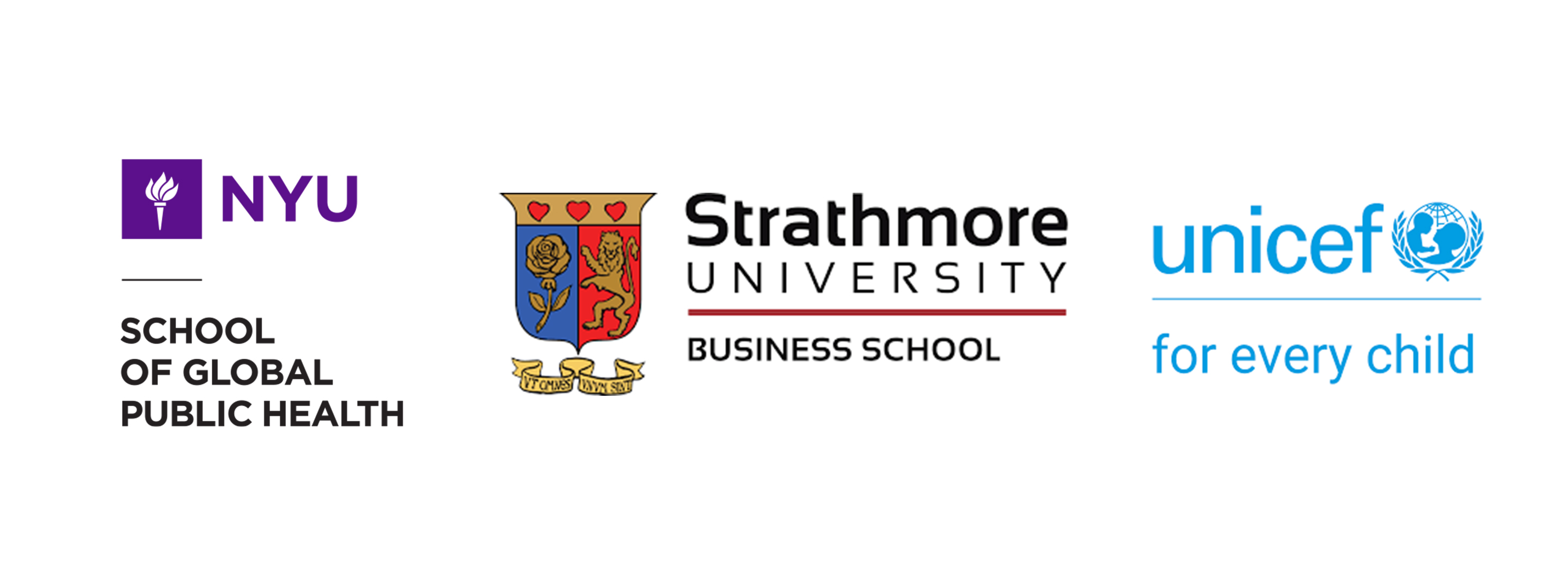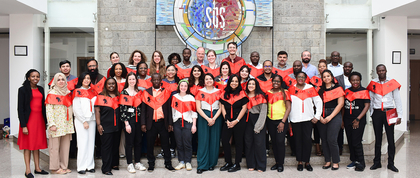
It’s one thing to learn global public health at a top school like NYU GPH by sharing a classroom with its world-class faculty. It’s yet another to experience it among those whom we intend to serve. That’s why a group of MPH students, UN professionals, and health system managers spent the day in a Nairobi slum while they were engaged in a week of intense coursework and strategy development.
They were there because NYU GPH partnered with Strathmore Business School (SBS) and the UNICEF Eastern and Southern Africa Regional Office (ESARO) on the 16th edition of its signature course titled Behavioral Communication Strategies for Global Epidemics (BCSE). The lead faculty were Drs. Chris Dickey (NYU GPH), Ben Ngoye (SBS), and Erma Manoncourt (NYU GPH, ex-UNICEF).
The 34 participants included 21 MPH students from NYU GPH, eight UNICEF staff (from Afghanistan, Tanzania, Malawi, Mozambique, and Pakistan), and five health management professionals from Kenya. They were organized into seven teams — each with a mix of students and professionals — to develop implementable Social and Behavior Change (SBC) strategies that address ongoing public health challenges in East Africa, Afghanistan, and Pakistan.
On Saturday, January 13th, the whole group went to a sub-county health facility called Kayole II, located in an urban slum in Nairobi’s Eastlands area. They were joined there by 12 local community health promoters. The BCSE participants and the Kayole II staff co-created systems maps for cholera risk due to the current unseasonable heavy rains. This activity underscored the participatory focus of the week and acknowledged the critical role that community health workers play in maintaining the Kenyan health system.
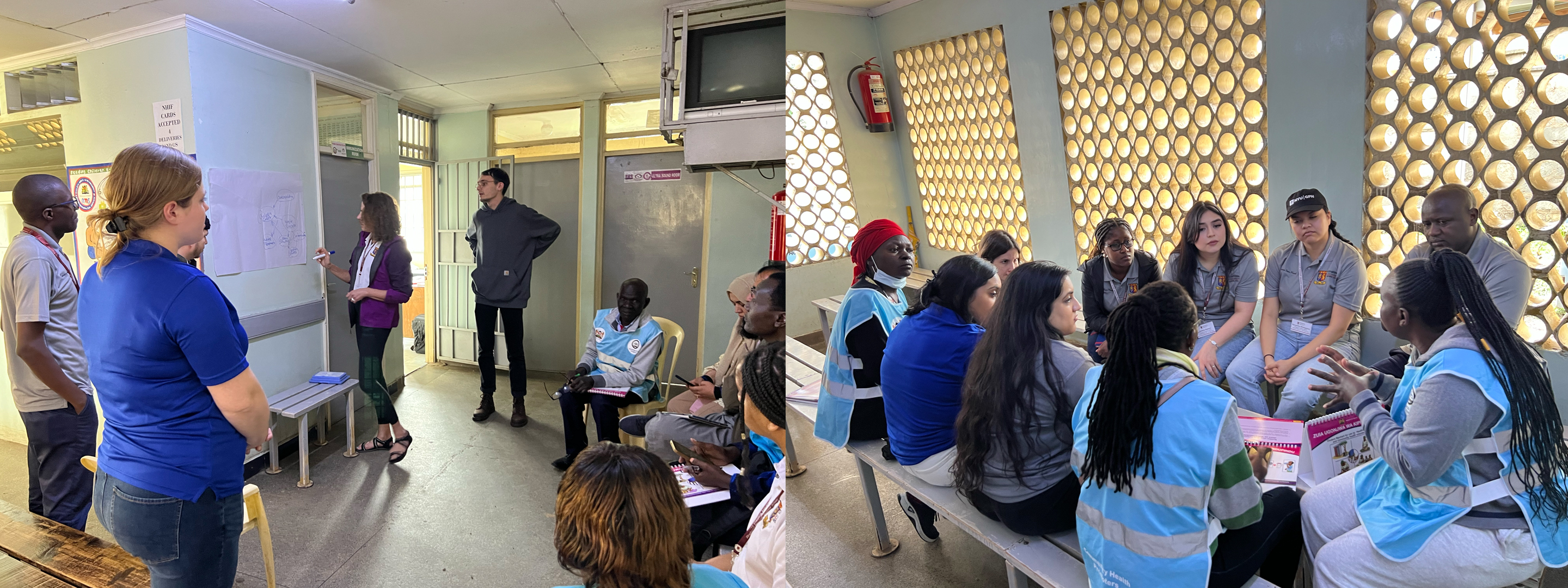
A diverse group of facilitators from GPH, UNICEF, SBS and the Kenya Red Cross Society then led the participants on the SBS campus through systems analysis, management, behavioral science, community engagement, operations and logistics, emergency response, monitoring & evaluation, human-centered design, and negotiation.
Each team created maps of the complex systems that result in increased cholera cases and resistance to vaccinations, showing how the system is at least as responsible for adverse outcomes as individual behaviors and that many of the contributing factors are not linearly related to the outcome. A visual systems map unpacks that complexity, shows the nonlinearities, and highlights potential leverage points. It also helps team members from diverse backgrounds share perspectives.
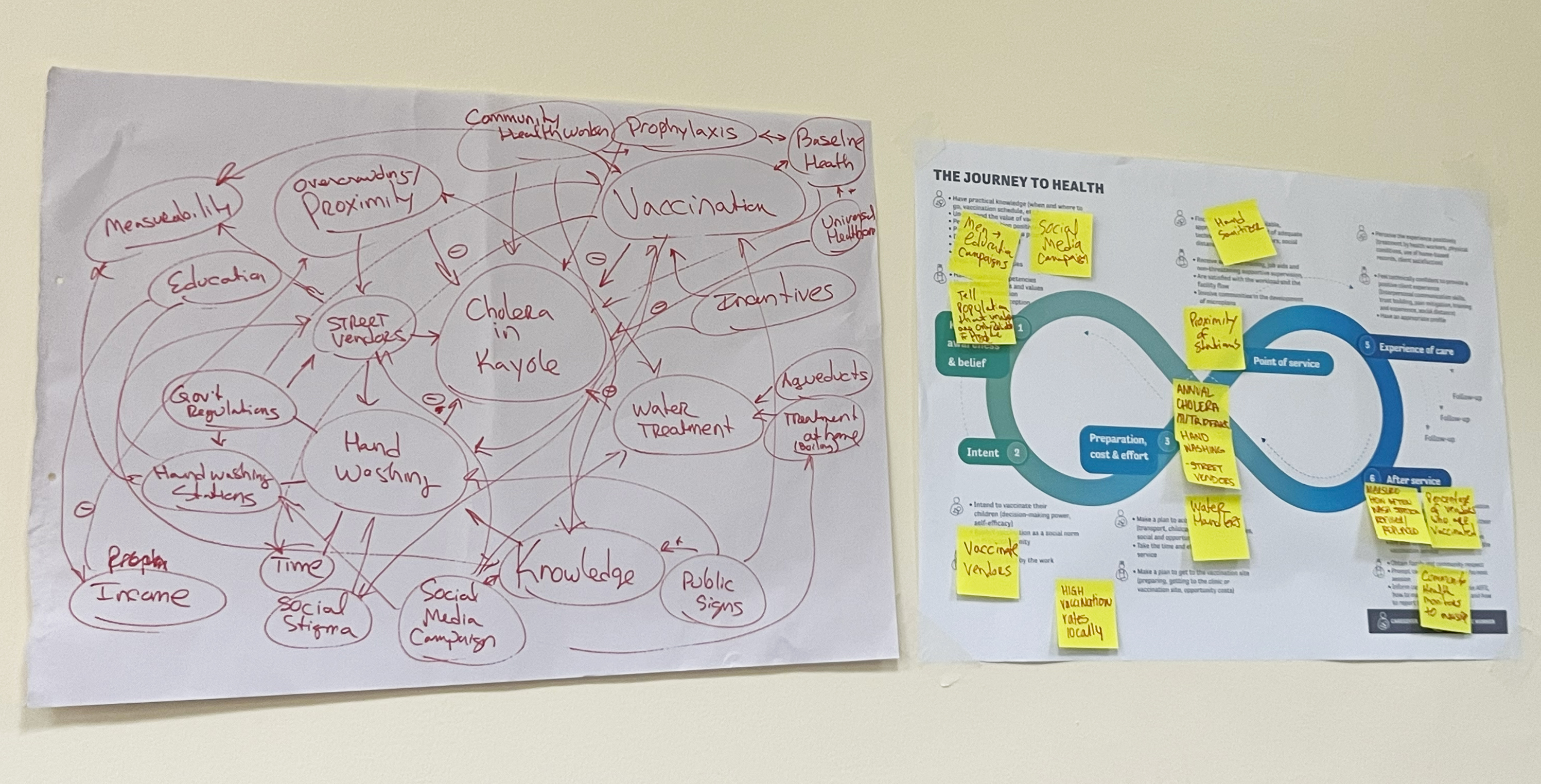
Starting with the systems map as a foundation, the teams developed behavioral strategies to influence health outcomes. The level of collaboration, focus and intensity within the teams was remarkable, as they worked late into the evenings. When asked why they worked so hard, several students remarked that it was because of the novel opportunity to create real-world strategies — alongside practitioners — that will benefit communities directly.
On Wednesday, January 17th, we asked the BCSE students to deliver a pitch for their strategy to SBS MBA in Healthcare Management students during an interactive lunch-time session. It was amazing to see the two overlapping cultures discuss operational goals, returns on investment, strategic benefits, and profits and losses in the context of cholera, HPV, polio, and routine immunization. These types of organized conversations are rare for public health and business school students, yet they are highly impactful.
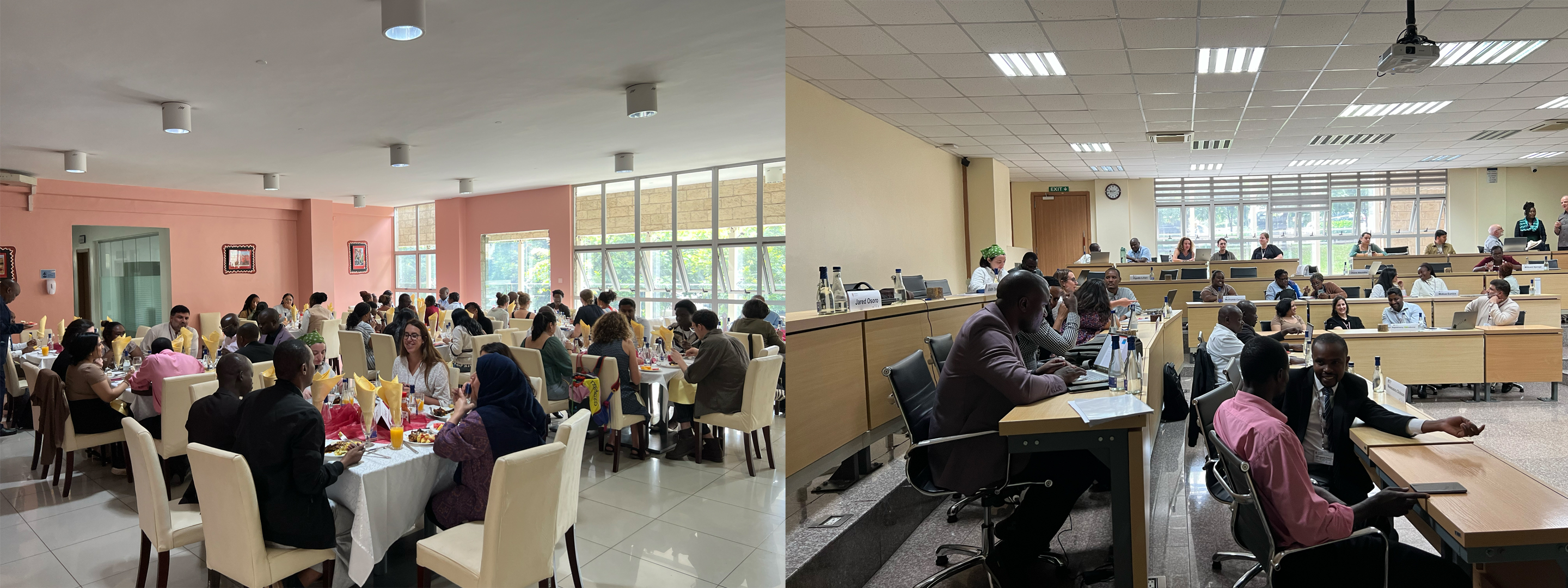
On the final day, the teams presented their strategies to a panel of judges that included:
- Akiko Sakaedani Petrovic, Chief of SBC , UNICEF Kenya;
- Dr. James Kisia, Kenya Country Director, Catholic Medical Mission Board;
- Dr. Jackline Aridi, Faculty Member, Institute of Healthcare Management, SBS; and
- Judy Gichuki, SBS PhD Candidate and Supervisor at Huruma Lions Health Facility in Nairobi.
The winning team proposed a community-partnered approach to reducing climate-change related outbreaks of cholera in Ilala District, Tanzania.
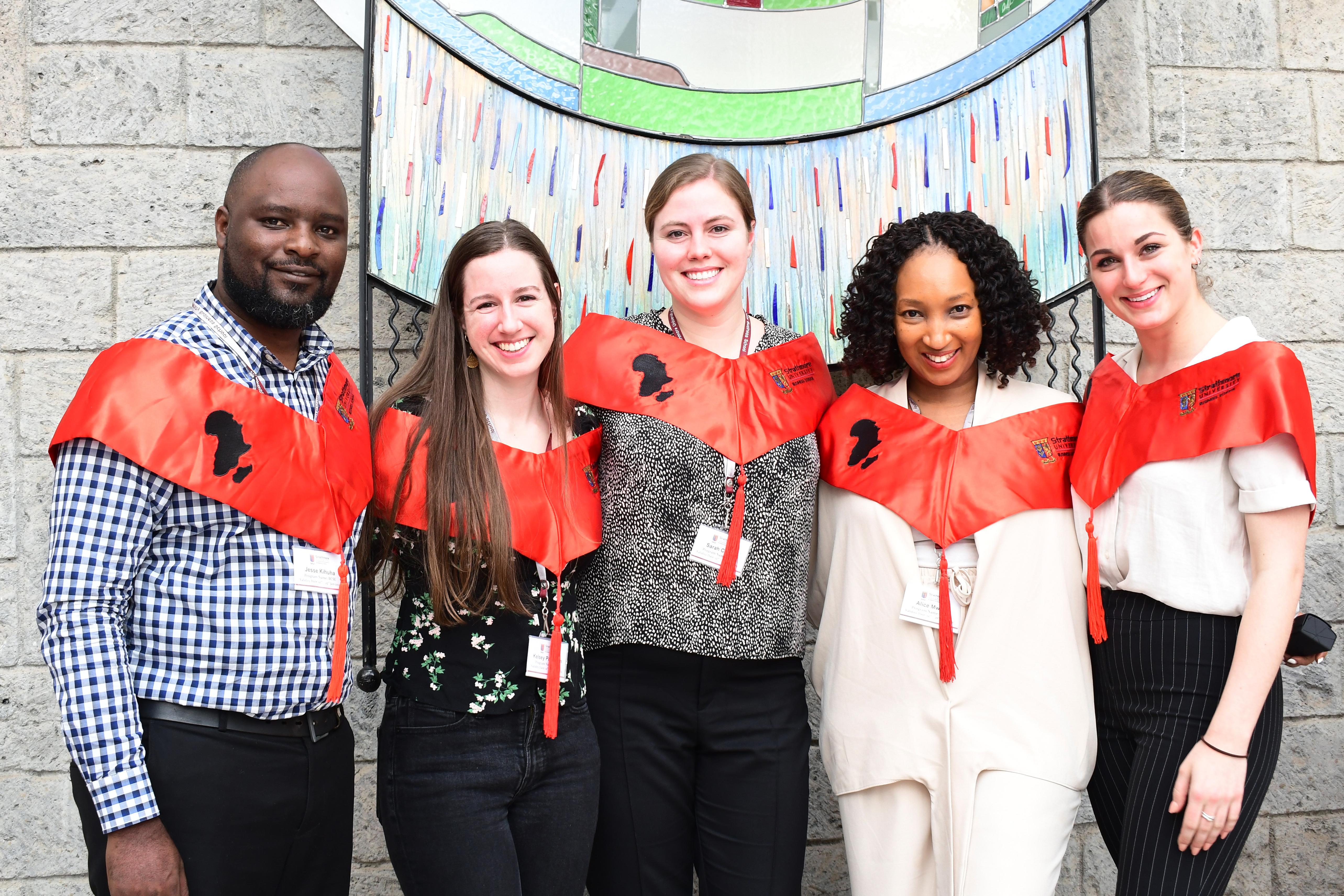
Pictured (from left to right): Jesse Kihuha MPH, Program Manager, Catholic Medical Mission Board, Kenya; Kelsey Patterson, GPH MPH student; Sarah Crisci, GPH MS student; Alice Mwiru, SBC Specialist, UNICEF Tanzania; and Anatea Einhorn, GPH MPH student.
In addition to the winning proposal, the judges evaluated six other strategies that address cholera in Kayole; polio vaccination in Tanzania and in Taliban-led Afghanistan; reduction of zero-dose vaccinations in Pakistan; and the introduction of HPV vaccines in Ghana and Mozambique. All of the strategies began with understanding the priorities and competing interests of the communities at risk, with feedback loops that adjust the program depending on how the population responds to the strategy. This ensures that projects are not only human-centered, but also iterative and responsive to the complex environment.
We understand that there are still plenty of barriers to implementation, as the teams will need to mobilize resources and support from individuals in their home offices that were not in the class. Since all of the strategies focus on immediate, pressing challenges, and since each has a local advocate and creator, we remain confident that the programs will strongly influence the way forward in Tanzania, Afghanistan, Mozambique, Ghana, Pakistan and Nairobi City County, Kenya. This type of impact is what drew everyone in the class — faculty included — to public health in the first place.
The participants will now join a BCSE alumni network of more than 800 global public health professionals, employed in close to 100 countries. This powerful resource is useful in finding jobs and research opportunities among other benefits. It is as valuable to our UN and government professional alumni as it is to the NYU GPH graduates.
“The highlight of this course was the ability to partner with UNICEF and Strathmore to strategically address global challenges which placed us in a unique position to be of service and become agents of positive change. To do this, we were given the incredible opportunity to work with the backbone of the Kenyan healthcare system and receive insight from the community health promoters who work closest to the outbreaks. These interactions with integral actors in the public health field made the experience much more impactful by learning from their professional experience in the field. Making the pie bigger!”
-Natalia Ramon, GPH MPH student, Epidemiology
“As a Social and Behaviour Change specialist, I felt uplifted by the intense yet well-structured program led by experienced practitioners. My knowledge and confidence in approaching public health emergencies have definitely reached a higher level. I am now looking forward to changing the behavior of the people in my community, one individual at a time, using a more defined SBC approach. Asante sana!”
-Alice Mwiru, SBC Specialist, UNICEF Tanzania
“This crash course has fundamentally evolved my approach to Social & Behavioral Change, particularly in the context of public health emergencies. It's been an insightful journey through strategy development, systems mapping, community resilience, and effective negotiation tactics, along with mastering (Accountability to Affected Populations) and feedback mechanisms. I'm thoroughly enriched, both intellectually and emotionally."
-Elisha Simon Maghiya, Internet of Good Things, UNICEF Tanzania
BCSE Course Facilitators
Dr. Chris Dickey - NYU GPH
Dr. Ben Ngoye - SBS
Dr. Erma Manoncourt - M&D Consulting Inc., NYU GPH
Helena Bon - UNICEF HQ Major (Rtd.) Venant Ndigila, Kenya Red Cross Society
Rachel James - The Collective Service, UNICEF ESARO
Dr. Jonathan Annan - SBS
Sarah Harriet Zikusooka - UNICEF HQ
Dr. Ukasha Ramli - UNICEF HQ
Anastasiia Atif - UNICEF ESARO
Dr. Chikondi Khangamwa - UNICEF ESARO
